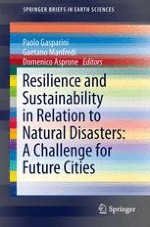
2014 | OriginalPaper | Buchkapitel
1. Economic Resilience and Its Contribution to the Sustainability of Cities
verfasst von : Adam Rose
Erschienen in: Resilience and Sustainability in Relation to Natural Disasters: A Challenge for Future Cities
Aktivieren Sie unsere intelligente Suche, um passende Fachinhalte oder Patente zu finden.
Wählen Sie Textabschnitte aus um mit Künstlicher Intelligenz passenden Patente zu finden. powered by
Markieren Sie Textabschnitte, um KI-gestützt weitere passende Inhalte zu finden. powered by